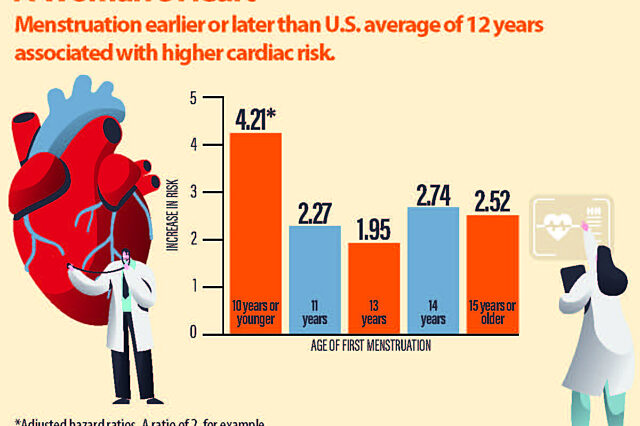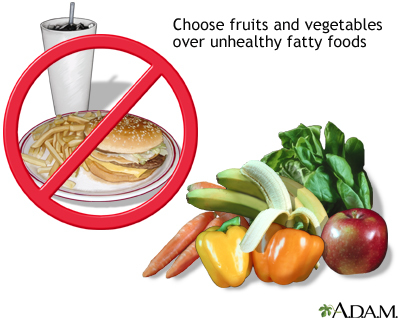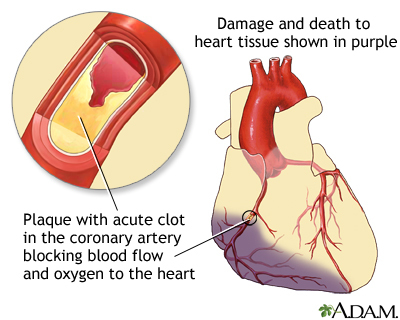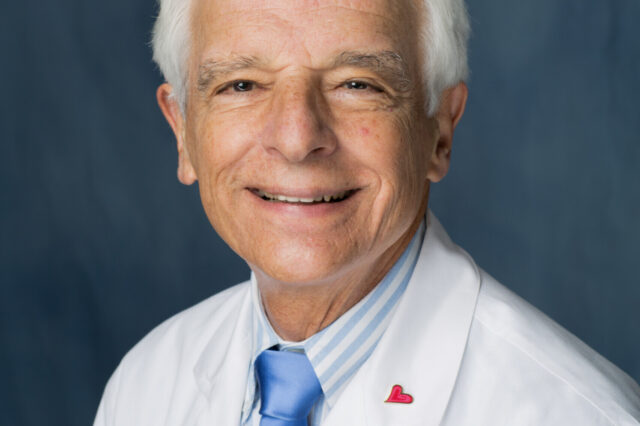Alternative Names
CAD - women; Coronary artery disease - women
Information
People often do not consider heart disease a woman's disease. Yet cardiovascular disease is the leading killer of women over age 25. It kills nearly twice as many women in the United States as all types of cancer.
Men have a greater risk for heart disease earlier in life than women. Women's risk increases after menopause.
EARLY HEART DISEASE SIGNS
Women may have warning signs that go unnoticed for weeks or even years before a heart attack occurs.
- Men most often have the "classic" heart attack signs: tightness in the chest, arm pain, and shortness of breath.
- Women's symptoms can resemble those of men.
- Women may also report other symptoms, such as nausea, fatigue, indigestion, anxiety, and dizziness.
ACT IN TIME
Recognizing and treating a heart attack right away improves your chance for survival. On average, a person having a heart attack will wait for 2 hours before calling for help.
Know the warning signs and always call 911 or the local emergency number within 5 minutes of when symptoms begin. By acting quickly, you can limit damage to your heart.
MANAGE YOUR RISK FACTORS
A risk factor is something that increases your chance of getting a disease or having a certain health condition. You can change some risk factors for heart disease. Other risk factors you cannot change.
Women should work with their health care provider to address risk factors they can change.
- Use lifestyle measures to keep your blood cholesterol levels in the right range. Targets for cholesterol levels vary, depending on your risk factors. Ask your provider which targets are best for you.
- Keep your blood pressure in a healthy range. Your ideal blood pressure level will depend on your risk factors. Discuss your target blood pressure with your provider.
Estrogen is no longer used to prevent heart disease in women of any age. Estrogen may increase the risk for heart disease in older women. However, it may still be used for some women to treat hot flashes or other medical problems.
- Estrogen use is probably safest for women under age 60.
- It should be used for the shortest possible period of time.
- Only women who have a low risk for stroke, heart disease, blood clots, or breast cancer should take estrogen.
LIVE A HEALTHY LIFESTYLE
Some of the risk factors for heart disease that you CAN change are:
- Do not smoke or use tobacco.
- Get plenty of exercise. Women who need to lose weight or maintain their weight should get at least 60 to 90 minutes of moderate-intensity exercise on most days. To maintain your health, get at least 30 minutes of exercise a day, preferably at least 5 days a week.
- Maintain a healthy weight. Women should strive for a body mass index (BMI) of 18.5 to 24.9 and a waist smaller than 35 inches (90 cm).
- Get checked and treated for depression, if necessary.
- Women with high cholesterol or triglyceride levels may benefit from omega-3 fatty acid supplements.
If you drink alcohol, limit yourself to no more than one drink per day. Do not drink just for the purpose of protecting your heart.
Good nutrition is important to your heart health, and it will help control some of your heart disease risk factors.
References
Fihn SD, Blankenship JC, Alexander KP, et al. 2014 ACC/AHA/AATS/PCNA/SCAI/STS focused update of the guideline for the diagnosis and management of patients with stable ischemic heart disease: a report of the American College of Cardiology/American Heart Association Task Force on Practice Guidelines, and the American Association for Thoracic Surgery, Preventive Cardiovascular Nurses Association, Society for Cardiovascular Angiography and Interventions, and Society of Thoracic Surgeons. Circulation. 2014;130(19):1749-1767. PMID: 25070666 pubmed.ncbi.nlm.nih.gov/25070666/.
Gulati M, Merz CNB. Cardiovascular disease in women. In: Libby P, Bonow RO, Mann DL, Tomaselli GF, Bhatt DL, Solomon SD, eds. Braunwald's Heart Disease: A Textbook of Cardiovascular Medicine. 12th ed. Philadelphia, PA: Elsevier; 2022:chap 91.
Hodis HN, Mack WJ, Henderson VW; ELITE Research Group, et al. Vascular effects of early versus late postmenopausal treatment with estradiol. N Engl J Med. 2016;374(13):1221-1231. PMID: 27028912 pubmed.ncbi.nlm.nih.gov/27028912/.
Meschia JF, Bushnell C; American Heart Association Stroke Council, et al. Guidelines for the primary prevention of stroke: a statement for healthcare professionals from the American Heart Association/American Stroke Association. Stroke. 2014;45(12):3754-3832. PMID: 25355838 pubmed.ncbi.nlm.nih.gov/25355838/.
Mora S, Libby P, Ridker P. Primary prevention of cardiovascular disease. In: Libby P, Bonow RO, Mann DL, Tomaselli GF, Bhatt DL, Solomon SD, eds. Braunwald's Heart Disease: A Textbook of Cardiovascular Medicine. 12th ed. Philadelphia, PA: Elsevier; 2022:chap 25.
Mosca L, Benjamin EJ, Berra K, et al. Effectiveness-based guidelines for the prevention of cardiovascular disease in women--2011 update: A guideline from the American Heart Association. Circulation. 2011;123(11):1243-1262. PMID: 21325087 pubmed.ncbi.nlm.nih.gov/21325087/.
Smith SC Jr, Benjamin EJ, Bonow RO, et al. AHA/ACCF secondary prevention and risk reduction therapy for patients with coronary and other atherosclerotic vascular disease: 2011 update: a guideline from the American Heart Association and American College of Cardiology Foundation endorsed by the World Heart Federation and the Preventive Cardiovascular Nurses Association. J Am Coll Cardiol. 2011;58(23):2432-2446. PMID: 22055990 pubmed.ncbi.nlm.nih.gov/22055990/.
The NAMS Hormone Therapy Position Statement Advisory Panel. The 2017 hormone therapy position statement of The North American Menopause Society. Menopause. 2017;24(7):728-753. PMID: 28650869 pubmed.ncbi.nlm.nih.gov/28650869/.






